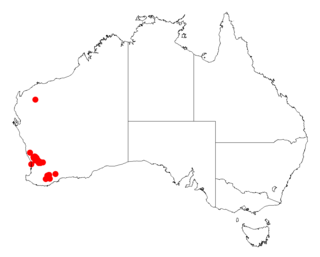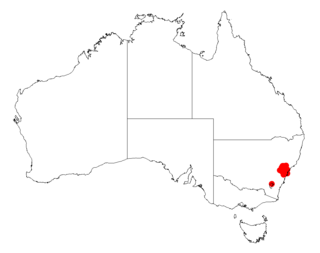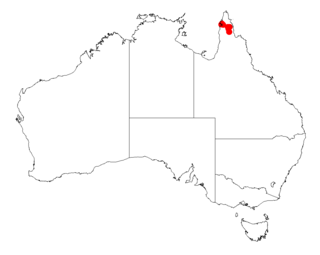
Acacia drepanocarpa is a shrub belonging to the genus Acacia and the subgenus Juliflorae native to northern Australia.

Acacia jibberdingensis, also known as Jibberding wattle or willow-leafed wattle, is a shrub or tree belonging to the genus Acacia and the subgenus Juliflorae that is endemic to Western Australia.

Acacia wickhamii is a shrub belonging to the genus Acacia and the subgenus Juliflorae that is endemic to parts of northern Australia.

Acacia crassistipula is a shrub belonging to the genus Acacia and the subgenus Phyllodineae that is endemic to western Australia.

Acacia robiniae, commonly known as Robin's wattle, is a shrub of the genus Acacia and the subgenus Phyllodineae that is endemic to south western Australia.

Acacia rossei, also known as Yellowdine wattle, is a shrub of the genus Acacia and the subgenus Phyllodineae that is endemic to south western Australia.

Acacia calantha is a shrub belonging to the genus Acacia and the subgenus Phyllodineae native to Queensland in Australia.

Acacia holotricha is a shrub belonging to the genus Acacia and the subgenus Phyllodineae that is native to parts of north eastern Australia.

Acacia polifolia is a shrub belonging to the genus Acacia and the subgenus Phyllodineae that is native to parts of eastern Australia.

Acacia saliciformis is a shrub or tree belonging to the genus Acacia and the subgenus Phyllodineae native to eastern Australia.

Acacia blakei, commonly known as Blake's wattle or Wollomombi wattle, is a shrub belonging to the genus Acacia and the subgenus Juliflorae that is native to north eastern Australia.

Acacia caroleae, also known as Carole's wattle or narrow leaf currawong, is a shrub belonging to the genus Acacia and the subgenus Juliflorae that is native to north eastern Australia.

Acacia cretata is a shrub or tree belonging to the genus Acacia and the subgenus Juliflorae that is native to north eastern Australia.

Acacia curranii, also known as curly-bark wattle, is a shrub belonging to the genus Acacia and the subgenus Juliflorae that is native to north eastern Australia. It is listed as vulnerable under the Environment Protection and Biodiversity Conservation Act 1999.

Acacia helicophylla is a shrub belonging to the genus Acacia and the subgenus Juliflorae that is native to northern Australia.

Acacia linarioides is a shrub belonging to the genus Acacia and the subgenus Juliflorae that is native to north Australia.

Acacia legnota, also known as heath wattle, is a shrub of the genus Acacia and the subgenus Plurinerves that is endemic to an area of north eastern Australia.

Acacia microsperma, commonly known as bowyakka, is a shrub of the genus Acacia and the subgenus Plurinerves that is endemic to an area of eastern Australia. It is rated as least concern according to the Nature Conservation Act 1992.

Acacia ommatosperma is a shrub of the genus Acacia and the subgenus Plurinerves that is endemic to an area of north western Australia.

Acacia viscidula, also known as sticky wattle, is a shrub of the genus Acacia and the subgenus Plurinerves that is endemic to an area of eastern Australia.




















